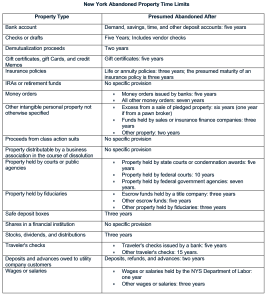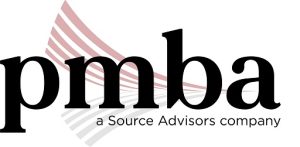Over the past six months, companies have been receiving notices requesting that they comply with the filing requirements of New York State’s Abandoned Property Law (APL). The Office of Unclaimed Funds has been sending packages with information regarding their Voluntary Compliance Program.
The program aims to encourage companies who have not filed or paid their potential unclaimed property to come forward and voluntarily pay what they owe without incurring penalties or interest, provided they reply within a designated amount of time. As of April 4, 2016, the window for the Voluntary Compliance Program has officially closed. However, we have been successful in securing an additional 90-day extension for certain companies, but you must act immediately.
Unclaimed property services have become increasingly more popular as states are requiring companies from many different industries to report any unclaimed property based on the property type and each state’s dormancy rules surrounding each property type. In general, these consist of savings or checking accounts, uncashed checks, matured certificates of deposit, stocks, bonds or mutual funds, traveler’s checks or money orders and proceeds from life insurance policies.
New York’s APL was enacted to protect individuals from losing their assets to businesses who were easygoing with their notifications to debtees. A property is usually presumed abandoned if there has not been any activity on the account for a set period, usually between two and five years.
Unclaimed Property Penalties
Non-compliance can be costly. Companies who fail to comply are subject to audit and are potentially liable for interest and penalties. In New York, the lookback period, regardless of whether a company chooses to report through the Voluntary Compliance Program or not, is January 1, 1992. The interest that will be assessed will be at 10% per year computed for a period to commence upon the date such payment or delivery was required and to terminate upon the date of full compliance therewith. Any person willfully failing to make any full and complete report or to file any affidavit required shall be fined the sum of $100 for each day such report or affidavit shall be willfully delayed or withheld.
Retailers’ Challenges with Unclaimed Property
 Although retailers have to deal with the standard unclaimed property items such as refund checks, uncashed vendor payments and uncashed payroll checks, the largest liability usually surrounds gift card liability. Under the New York State APL, New York-based companies must report any balance remaining on a gift card after five years of dormancy with the New York State’s Office of Unclaimed Funds; different industries have specific reporting time-frames. Gift cards fall under general corporations, so the remittance and report date would fall on March 10.
Although retailers have to deal with the standard unclaimed property items such as refund checks, uncashed vendor payments and uncashed payroll checks, the largest liability usually surrounds gift card liability. Under the New York State APL, New York-based companies must report any balance remaining on a gift card after five years of dormancy with the New York State’s Office of Unclaimed Funds; different industries have specific reporting time-frames. Gift cards fall under general corporations, so the remittance and report date would fall on March 10.
Delaware has a similar APL and the dormancy period for gift certificates is five years. In fact, the dormancy period for most property is five years except for securities (dividends, interest and equity payments) and fiduciaries (escrow accounts, traditional and Roth IRA’s). Property must be reported in electronic format by March 1 using the Form AP-1 (or AP-2 for a property with less than 10 owners). Companies are now required to conduct a due diligence mailing in order to contact all holders of securities-related property valued at over $250.
Most states follow the standard “priority rules” in determining who has the right to the unused gift cards. If an address appears on the company’s records, the unclaimed property would be reported there. However, in the event that an owner or an address cannot be found, unclaimed property goes to the state in which the company holding the property is incorporated. This is a major source of income for Delaware because so many corporations are formed there. However, this can become tricky, which is evident by a lawsuit filed by Pennsylvania challenging Delaware’s claim to over $10 million in abandoned property. Pennsylvania is arguing that money orders purchased in Pennsylvania that went uncashed should be remitted to Pennsylvania; however, they were remitted to Delaware because that is where the company is incorporated.
How Does a GiftCo Work
A GiftCo is an entity established by retailers to manage their gift card programs. One of the benefits of creating a GiftCo is to incorporate the company in a state that does not require companies to escheat unused gift cards, such as Florida or Ohio. A Florida company called Card Compliance has been one of the largest players in this market. Card Compliance offers companies “turn-key” solutions to creating GiftCos for any size retailer. Delaware has been the biggest loser due to retailers establishing Giftcos and they have aggressively fought for their fair share. Delaware has numerous court battles with many retailers as well as Card Compliant. In December, the Superior Court of Delaware is a Memorandum Opinion and Order that was not favorable to the Defendants.
How To Comply With Unclaimed Property Laws
Many States have offered voluntary compliance programs to assist all companies with the burden of complying with these complex rules. As previously mentioned, the official window for the Voluntary Compliance Program in New York has closed for most companies. However, we have been successful in obtaining an additional 90-day extension for certain companies.
Please contact us immediately if you would like additional information on this program.

